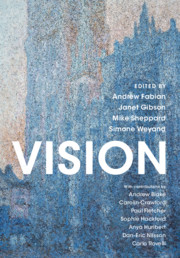Book contents
- Vision
- The Darwin College Lectures
- Vision
- Copyright page
- Dedication
- Contents
- Figures
- Notes on Contributors
- Acknowledgements
- Introduction
- 1 The Evolution of Eyes
- 2 Visions
- 3 Colour and Vision
- 4 Science, Vision, Perspective
- 5 Vision of the Cosmos
- 6 Visions of a Digital Future
- 7 Computer Vision
- Index
- References
2 - Visions
Published online by Cambridge University Press: 17 September 2021
- Vision
- The Darwin College Lectures
- Vision
- Copyright page
- Dedication
- Contents
- Figures
- Notes on Contributors
- Acknowledgements
- Introduction
- 1 The Evolution of Eyes
- 2 Visions
- 3 Colour and Vision
- 4 Science, Vision, Perspective
- 5 Vision of the Cosmos
- 6 Visions of a Digital Future
- 7 Computer Vision
- Index
- References
Summary
The brain strives to become a model of the world in which it must survive. It is often more important for it to be functional and efficient than it is to be factually correct. Indeed, there are numerous instances in which it seems to favour usefulness over accuracy, expectation over actuality. This has led many to conclude that even normal perception has a constructive or hallucinatory quality. In extremis, under the influence of fatigue, fear, illness or drugs, an entire reality may be created, one that seems to conflict with the reality accepted by those around us. This condition, known as psychosis, offers us important glimpses into the mechanisms of the mind and the many ways in which they may be altered.
Keywords
- Type
- Chapter
- Information
- Vision , pp. 33 - 56Publisher: Cambridge University PressPrint publication year: 2021

